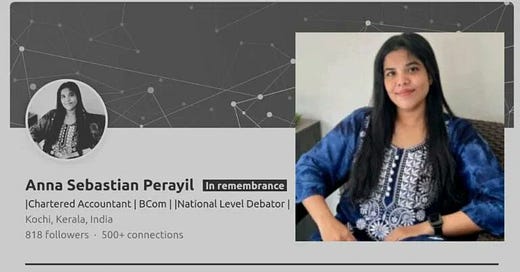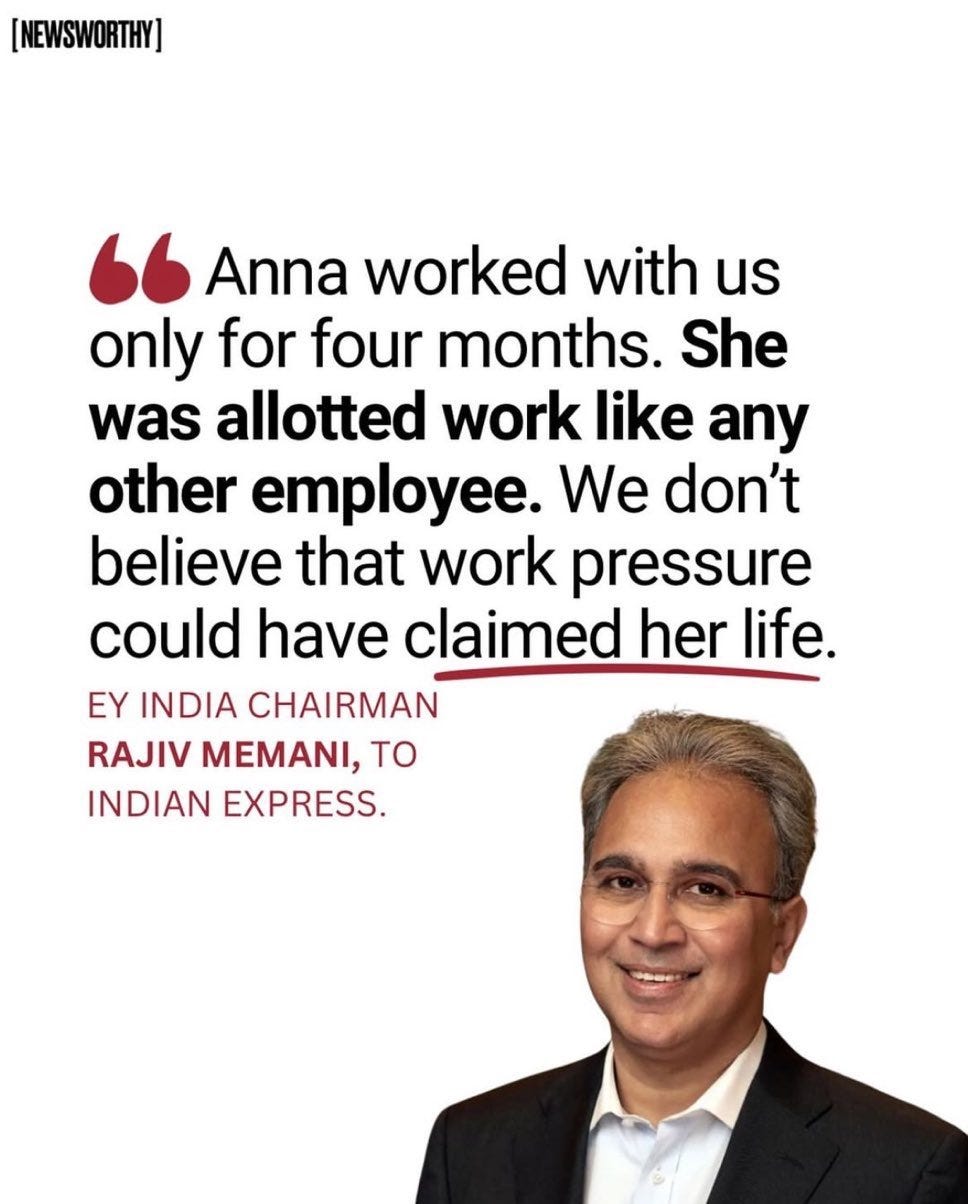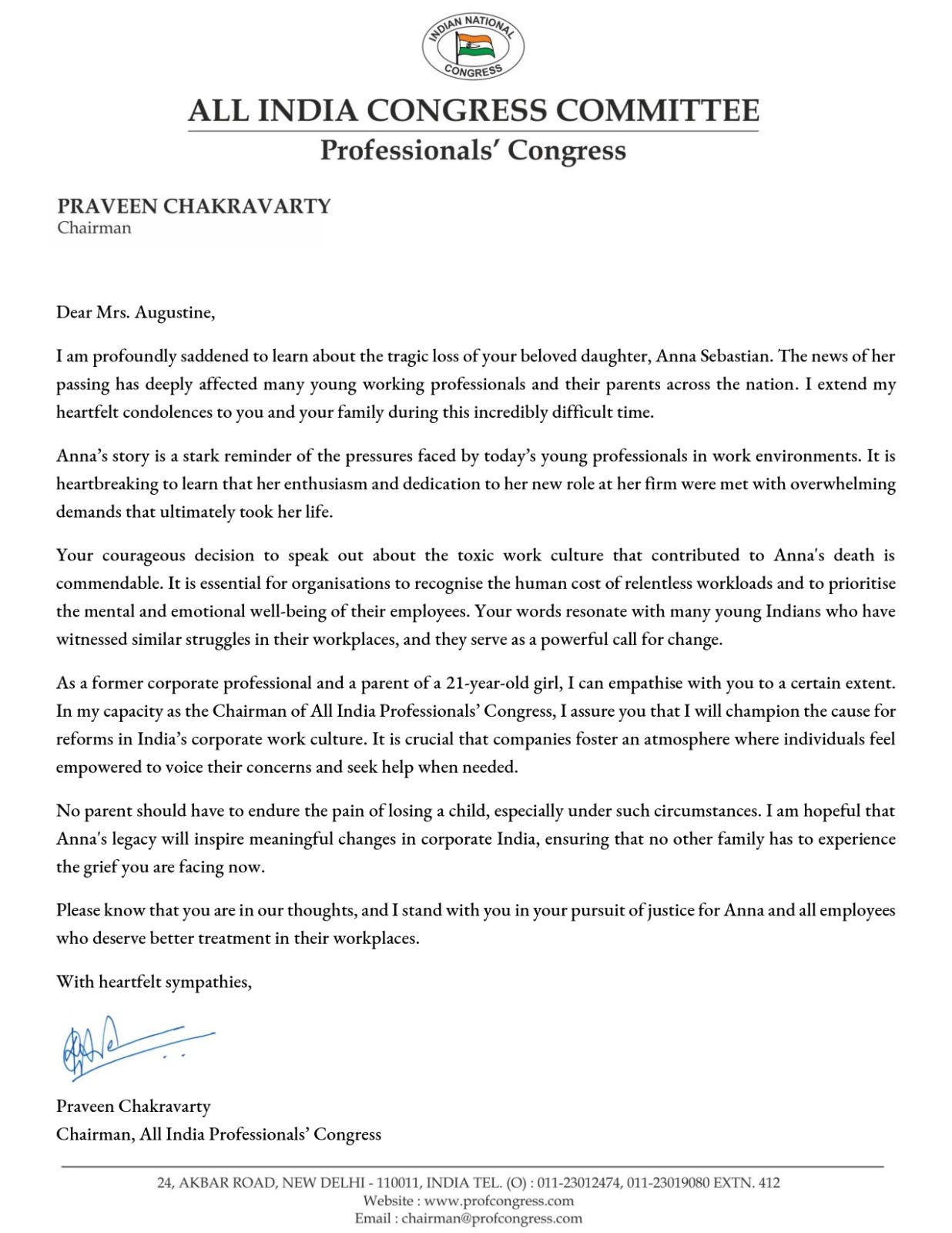Tragic Death of E&Y Employee: A Wake-Up Call for Systemic Reforms Beyond the Blame Game
The Tragic Death of Anna Sebastian Perayil and the Urgent Need for Workplace Health and Safety Norms and Enforcement.
The Tragic Death of Anna Sebastian Perayil of E&Y
The tragic death of Anna Sebastian Perayil, a 26-year-old chartered accountant at Ernst & Young (EY) in Pune, has sparked an urgent conversation about the state of health and safety measures for employees in white-collar sectors such as audit and consultancy firms, software companies, IT services, and BPO centres. This incident has highlighted not only physical safety issues but also the mental health challenges and toxic work environments that many young professionals endure in high-pressure industries, where long hours and relentless stress have become the norm rather than the exception.
Gaps in Health and Safety Measures in Commercial Establishments
While the **Factories Act** and other central labour laws offer substantial health and safety protections for industrial workers, the regulations governing shops and commercial establishments are far less defined and vary significantly across state jurisdictions. This lack of uniformity leads to inconsistent protections for employees in sectors such as consultancy, IT, and software. Unlike industrial workers, these employees are generally not classified as "workmen," which exempts them from the more structured labour protections found in factories and industrial establishments. Consequently, they are often subject to a hire-and-fire culture, where job security is tenuous, and employees can be dismissed with little notice.
This environment not only fosters a sense of profound job insecurity but also creates conditions ripe for exploitation, as employees may feel compelled to tolerate excessive demands and poor working conditions out of fear of losing their jobs. Beyond the issues of physical safety and exhaustion, these sectors also grapple with challenges related to mental health—an often overlooked but equally critical aspect of workplace well-being. The high-pressure nature of these industries, combined with long working hours and intense performance expectations, exacerbates the mental health struggles faced by many employees, further underscoring the need for comprehensive reforms in these sectors.
Reactive Measures and the Culture of Crisis-Driven Reforms in India
In India, workplace safety reforms and regulatory enforcement often follow a reactionary pattern, where meaningful changes are implemented only after a major crisis or tragedy. One of the most prominent examples of this reactive approach is the Visakha guidelines, introduced by the Supreme Court of India in 1997 to address sexual harassment in the workplace. It was only after years of neglect and increasing incidents of harassment that these guidelines were eventually codified into a central law under the Sexual Harassment of Women at Workplace (Prevention, Prohibition and Redressal) Act, 2013.
Similarly, the brutal Nirbhaya case of 2012, which shocked the nation with its horrific details of sexual violence, led to the amendment of several laws related to rape and crimes against women, marking a significant shift in the legal framework concerning women’s safety. However, like many other reforms, these changes were born out of tragedy rather than proactive policymaking.
More recently, the murder of a young doctor in Kolkata prompted widespread outrage and led to enhanced security measures and improved working conditions for medical professionals, especially women, in hospitals across the country. This pattern of responding to crises rather than preemptively addressing systemic issues has also extended to discussions on workplace pressures and mental health.
Notably, comments by respected industry leaders like Narayana Murthy, who advocated for 70-hour work weeks for the younger generation, have stirred public debate on the culture of overwork in high-pressure sectors. His remarks, seen by some as promoting productivity, have intensified discussions about the long-term health impacts of such demanding work environments, where mental exhaustion, burnout, and even physical breakdowns are increasingly common. These crises and high-profile statements underscore the need for a shift in how workplace safety, mental health, and employee well-being are addressed in India—moving from a culture of reactionary reforms to one that focuses on prevention and proactive regulation.
The Tragic Case of Anna Sebastian Perayil
Anna Sebastian Perayil’s untimely death on July 20, 2024, just four months after she joined E&Y in Pune, has become a flashpoint for discussing the unhealthy, rather toxic, work culture in many high-pressure jobs. A high-achieving chartered accountant, Anna passed her CA exams with distinction and joined E&Y's Audit team in March 2024. However, soon after, she began experiencing overwhelming stress, anxiety, sleeplessness, and physical exhaustion. Her mother, Anita Augustine, penned a letter to E&Y India Chairman Rajiv Memani, blaming the company’s toxic work culture for her daughter’s death.
In her letter, Anita described how Anna’s workload included late-night meetings, work being assigned at the end of the day, and an expectation to work weekends. She also highlighted the emotional toll these demands took on her daughter, ultimately contributing to her tragic demise. The letter further expressed deep disappointment that no one from E&Y attended Anna's funeral, underscoring a lack of empathy from the company.
E&Y’s Response and Government Investigation
In response to the incident, E&Y expressed deep sorrow and termed Anna’s passing as an "irreparable loss." The company stated that it is taking the family’s concerns seriously and has provided assistance to them. An internal email sent by Rajiv Memani, later leaked online, indicated the company's acknowledgment of the issue but denied claims that work pressure directly caused Anna’s death.
In the aftermath, the Union Labour Ministry has initiated an investigation into allegations of an unsafe and exploitative work environment at EY. Minister of State for Labour Shobha Karandlaje has affirmed the government’s commitment to ensuring justice in this case. However, as of now, the exact cause of Anna’s death has not been officially confirmed, and the investigation remains ongoing.
Health and Safety Measures for White-Collar Workers
Unlike the well-defined protections provided to industrial workers, employees in consulting and IT firms often lack sufficient safeguards. Many of these workers endure long hours, high stress, and an unhealthy work-life balance. State-level Shops and Establishments Acts regulate working hours, rest intervals, holidays, and some safety measures, but these laws are often inadequate in addressing the unique challenges faced by knowledge workers.
Workplace mental health is a growing concern in such industries, where work pressure and toxic environments can lead to burnout, anxiety, and other psychological issues. The Occupational Safety, Health, and Working Conditions Code (2020), while a step forward, falls short of addressing the nuances of white-collar work, where long hours and high expectations are the norm rather than the exception.
Calls for Comprehensive Reform
The tragic death of Anna Sebastian Perayil has exposed glaring gaps in workplace health and safety regulations for white-collar professionals. While existing laws provide some protections, they are often insufficient for addressing the mental health challenges faced by employees in high-stress environments. This tragedy should serve as a wake-up call for policymakers to introduce comprehensive legislation that addresses both the physical and mental well-being of employees.
Some areas where reforms are urgently needed include:
Reasonable Limits on Working Hours: Enforcing existing laws that limit working hours to 48 per week, with mandatory rest intervals, especially for consultancy and IT professionals.
Mandatory Mental Health Support: Large organisations should be required to provide mental health support services, including regular stress assessments and interventions.
Workplace Harassment and Bullying Protections: Strengthening legal frameworks to prevent workplace harassment, both verbal and psychological.
Right to Disconnect: Introducing policies that give employees the right to disconnect from work outside of designated hours, promoting work-life balance.
Adequate Leave and Rest: Ensuring that employees are entitled to sufficient leave and encouraging organisations to implement work-life balance initiatives like sabbaticals and part-time options.
A Call for Urgent Reform: Enough with the Exploitation
The tragic death of Anna Sebastian Perayil serves as a stark, heart-wrenching reminder of the devastating human cost of overwork and relentless workplace pressure. How long will India tolerate this pattern of exploitation, where highly educated and ambitious young professionals are pushed to the brink, while corporations extract maximum profits, benefiting senior partners and associates who do little more than leverage their connections to secure business? These firms—consultancy giants like E&Y—are squeezing their employees and clients for hefty returns, all while those at the top continue to thrive in their cushy positions.
It’s time for India to move beyond mere lip service and take concrete, proactive steps to protect its growing white-collar workforce. The enforcement of existing laws is no longer enough—India must introduce stringent new regulations that prioritise mental health, work-life balance, and fair treatment of employees. The Government of India, where the consultant culture has disturbingly infiltrated policymaking—the sacred realm of bureaucrats—must take a hard stance. Organisations that refuse to reform, even in the face of such a stark tragedy, should be blacklisted. Their lack of empathy, shown through nothing more than perfunctory condolence messages, is an insult to the very people they exploit.
It is shameful that international firms like Ernst & Young, who should be setting standards as model employers, have instead become colossal corporate machines that disregard the well-being of their workers. If India’s IT and consultancy sectors are to thrive sustainably, the well-being of individuals must be safeguarded—anything less is a betrayal of the very workforce that drives the country’s growth and global reputation. Enough is enough.
If you genuinely believe that the broader message conveyed in this article deserves wider attention, please don't hesitate to share it.







